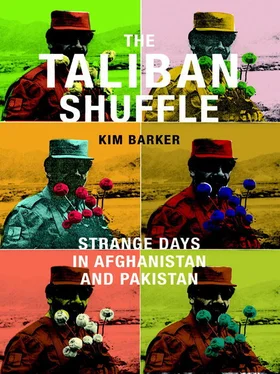Ultimate Fight Challenge was done. I hung up the phone and burst into tears. The next day, during the requisite conference call, the paper’s editor informed me that the company was unifying the foreign reporting team to serve everybody, which meant “more strategic company-wide use of our expertise.” He used words like “partnership” and phrases like “a big chessboard.” I felt like we were breaking up. All told, thirteen—or maybe sixteen—correspondents survived from both newspapers, including only two from the Tribune , which had once had eleven. (The numbers were unclear, because the company also kept a few Los Angeles Times correspondents on contract.)
“There’s no right or wrong choice,” said the big boss, adding that he thought I could use my expertise covering the war on terror in Chicago. The gangs must have really stepped up their game.
I could hardly blame the company—it was, after all, bankrupt, and foreign news cost a lot of money. My bureau cost about $120,000 a year in expenses alone. The Tribune foreign desk was essentially eliminated, almost quietly, just as the newsroom loudly promoted a class for “Advanced Twitter.” The Los Angeles Times would run the company-wide foreign desk, and the new foreign editor would be the same man who had written the competing Los Angeles Times story on Afghan Star , the one that had run the same day as mine and put me squarely in Sam Zell’s crosshairs. Curses—my nemesis. I felt sad and numb and rejected, almost like a spurned lover, but this rejection felt even more personal. I loved this job, I was this job. If I didn’t have this, what would I be?
I was given time to think about the metro offer, and I did think. I knew everything in Afghanistan was increasingly messed up. “America, Fuck Yeah” was the future. Many talented Afghans were leaving, including Farouq, whom I thought had abandoned his dreams of ever studying outside Afghanistan. He sent me an e-mail when he won a prestigious scholarship to a university in the West—to study communications, not medicine. I was not surprised—if Afghanistan ever got rid of the mullahs and warlords, that guy could run it. (Once, Farouq had told me how he would police a traffic roundabout with a hammer, breaking the windows of traffic offenders. “Believe me, people will enjoy my roundabout,” he had opined. That was his philosophy of governance in Afghanistan, the necessity of a strong hand.) Back in Pakistan, Samad continued building his life in his mother’s tiny apartment, washing his car fifty times a day. His wife was now pregnant, even though he barely had any money. Yet if all Samad ever had in his life was his family and his car, I knew he would be happy.
Afghanistan and Pakistan continued to dominate the news. The day after I was deemed irrelevant, news leaked that the term “war on terror” also was. The Obama administration preferred “Overseas Contingency Operation.” Days after that, Obama announced his much anticipated new strategy for Afghanistan and Pakistan. After more than seven years, the region had finally become a situation.
“The situation is increasingly perilous,” Obama warned.
An editor e-mailed me that night, asking if I had anything I’d like to add to a story on Obama’s speech. I said I was sick, and I kind of was. Within a month, that editor was laid off.
I still didn’t know what I would do, but I had to leave Pakistan and Afghanistan for now if I wanted to hold on to my salary. I also knew I had to get out of here if I wanted to get any perspective. Samad, ever the wounded puppy, started to cry when I told him and called me his sister. Large tears pooled in his large brown eyes.
“Stop it,” I said. “You’re killing me.”
Friends in Islamabad decided to throw me a going-away party at the house where I was staying. But that night, as I drew on eyeliner, I heard a distant thud outside. I chose to ignore it and went back to my eyeliner. Samad soon ran inside the house, knocking on my bedroom door.
“Boss, big bomb, maybe Jinnah,” he announced, agitated.
“No. No way. Not tonight.” I had moved on to mascara.
“Yes, boss. Tonight.” He smiled.
Samad still didn’t understand my syntax all that well. Jinnah was the giant supermarket closest to this neighborhood, where foreigners always shopped.
“I can’t fucking believe this.”
Samad looked at me. “Yes, boss?”
“Can you go check it out?” I asked.
“Yes, boss.”
He ran off.
A Swiss friend called, panicked. She was hiding with her boyfriend in a closet, the Swiss version of a safe room. She heard shots in all directions.
“I don’t think I can make it to your party,” she said.
I called Samad, now curious. Maybe I needed just one bomb for the road.
“Come pick me up.”
He really didn’t need to drive. We could have walked to the bombing, which was not at a supermarket but in a grassy median a couple of blocks away. A man had blown himself up near a tent filled with Pakistani security forces. Eight had died.
More than a hundred journalists were there, scribbling on notebooks, jostling for position. It was like old home week. A friend and I walked near an ambulance. Shots rang out. We dropped to the ground. Pakistani men in cream-colored salwar kameezes threw themselves on top of us and fondled us back across the street, over to the other journalists. I started laughing. This was the perfect going-away party for Pakistan. A senior police officer insisted that the situation was under control, even as shots ricocheted through the neighborhood, an alleged second bomber ran loose, and a group of elite armed soldiers darted in front of the house where the party was supposed to be.
“Should we still have the party?” I asked a friend from the Associated Press.
“Oh yeah,” she said. “Otherwise, the terrorists win.”
I certainly didn’t want that. So we threw the party, and most people came, filled with that need for alcohol and numbness that by now I knew accompanied any terrorist attack. (Tammy stayed home—she was too depressed about Pakistan.) At the end of the night, fueled by booze, socks, and a treacherous marble staircase, I fell. The next morning, I woke up with a knot the size of a golf ball on my forehead. I left Pakistan a few days later with a concussion and slight double vision, and without telling my bosses. And that, I later realized, was how Pakistan should always be left. With a head injury.
Pondering my options on the flight home, I realized I would rather scoop out my eyeballs with a rusty spoon than go back to my life from seven years earlier. This came as a shock. The newspaper industry was hemorrhaging jobs left and right—by the end of that year, more than forty thousand jobs would be cut. I should count myself lucky to hold on to any job at any major newspaper. But after covering these countries, after writing about life and death and chaos and war, I knew I couldn’t just write about frenzied families and carefree couples in Chicago, the paper’s new target demographic. I couldn’t move backward. My heart wouldn’t be in it because my heart would still be somewhere halfway around the world, wearing a flak vest.
I decided to do something I had never done before. Quit. And, in a move that many deemed insane, I decided to go back to Afghanistan to have a quiet place to figure out what I wanted to do next. Maybe it was the story, which had burrowed into my bloodstream, or the concussion. And maybe it was the newspaper industry, and the fact that no one was willing to pay for the news anymore. Only a few weeks after I quit, the bare-bones Tribune newsroom would be forced to lay off more than fifty people. The same day, the company’s bosses would ask the U.S. Bankruptcy Court to pay more than $13 million in bonuses to almost seven hundred people deemed essential to the future of the company. Still, Sam Zell couldn’t stop talking about Afghanistan. That same night, he would tell a group of college students: “I’m not going to the Chicago Tribune for news about Afghanistan.” Of that, I was absolutely certain.
Читать дальше











